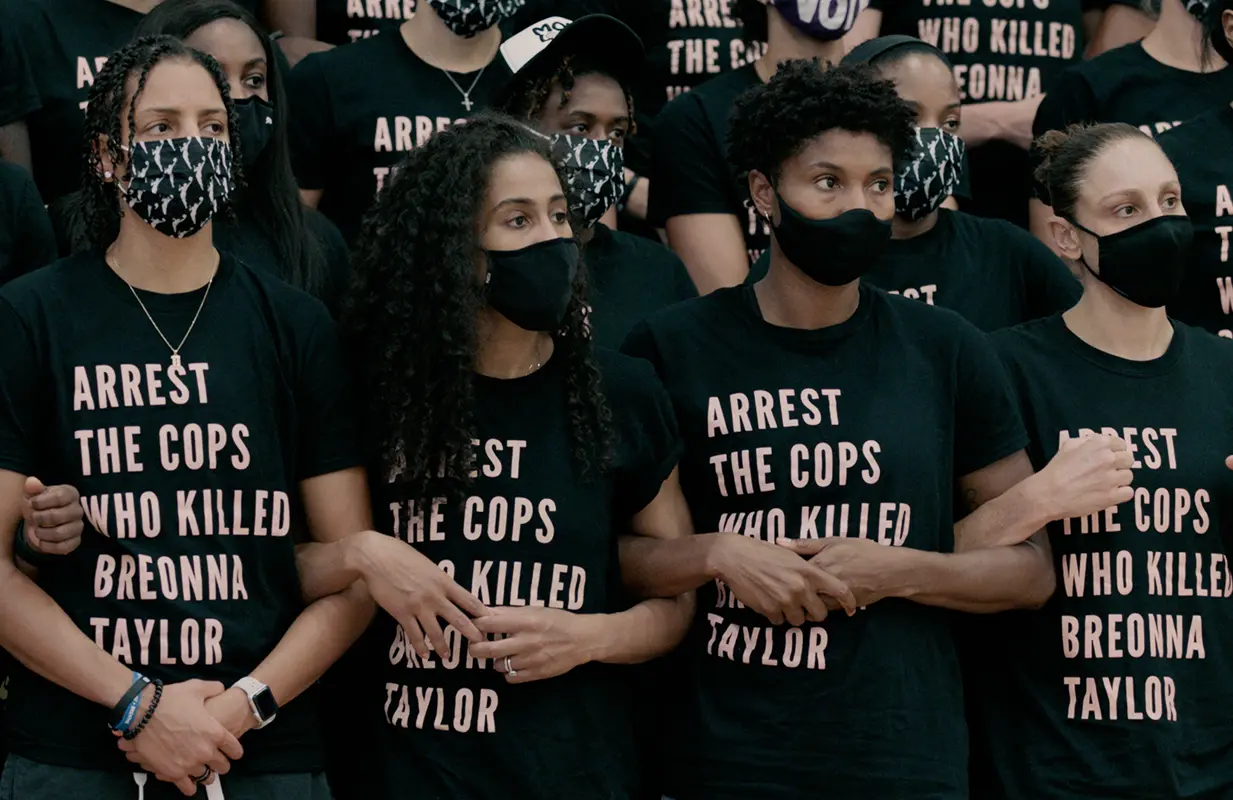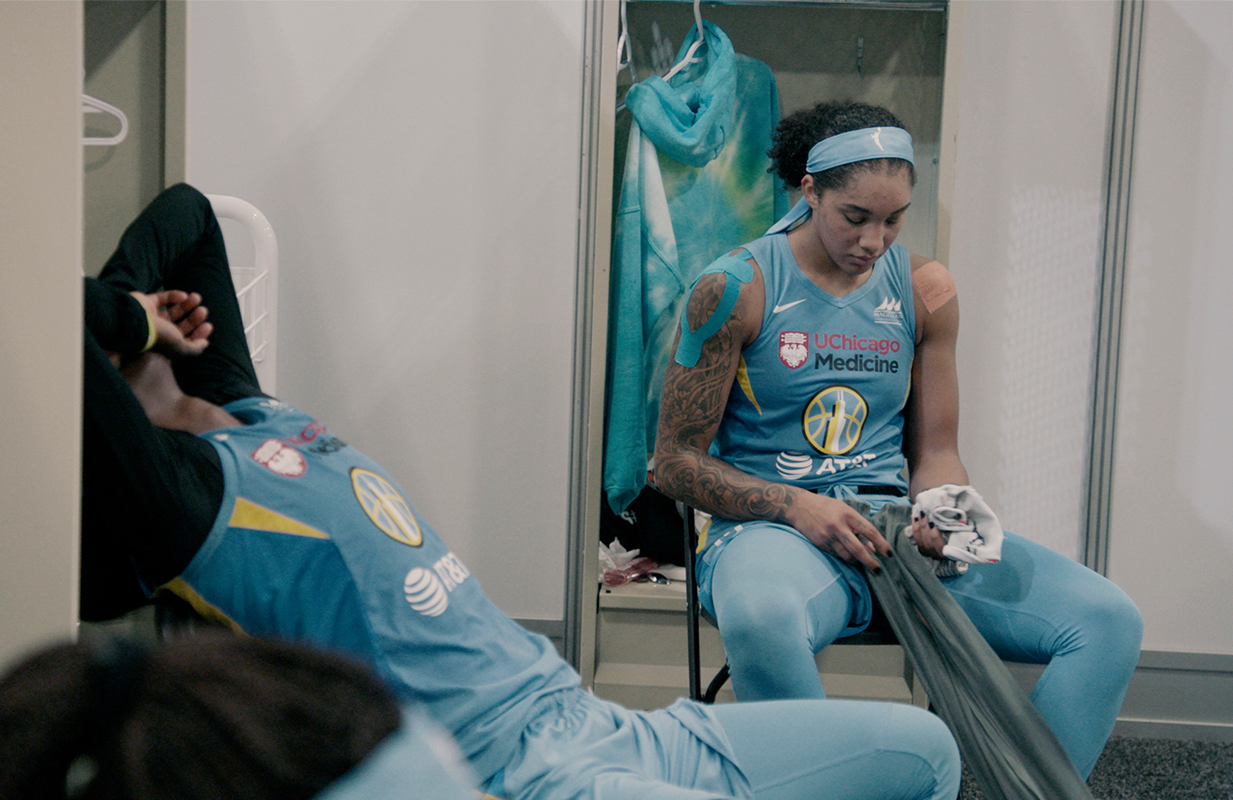The WNBA Rises to the Occasion in ESPN's 144
-
 144 WNBA players gather to demand justice for Breonna Taylor (Joshua W. Smith/ESPN)
144 WNBA players gather to demand justice for Breonna Taylor (Joshua W. Smith/ESPN)If there’s one word that defines 144, ESPN Films’ new documentary about the WNBA bubble, it’s “exhausted.” The athletes, tasked with playing 147 games in 97 days, are exhausted, both physically and mentally. They’re exhausted from seeing Black people murdered by police and the endless cycle of promises followed by inaction. They’re exhausted by their league’s precarious position. They’re exhausted by a media landscape that seems to consider them an afterthought.
And yet, the athletes of the WNBA fight on. They fight for justice, dedicating their season to Say Her Name and Breonna Taylor. They fight for their children and families, many of whom rely on their paychecks to survive. They fight for respect, for ratings, for funds, for attention, and — in 2020 — for the season itself.
The WNBA’s willpower is put on full display in 144, which tracks the league’s 144 players throughout their three-plus months in the bubble (or the “Wubble,” as it became known) at IMG Academy in Bradenton, Florida. Directed by Lauren Stowell and Jenna Contreras, the latter of whom spent 62 days in the bubble, the film explores a season dedicated to social justice and everything the players overcame to make it happen.
Unlike the NBA, which was in the middle of the season when COVID-19 hit, the WNBA was in its offseason, which gave league staffers and players more time to determine how to proceed. However, despite legitimate concerns about players’ health and overall safety, 144 makes clear that canceling the WNBA season was not an option.
“What I was trying to convince, certainly, the players on is, we cannot be out of the sports landscape for more than 20 months,” says league commissioner Cathy Engelbert. “Had we not played and started up in May ‘21, that’s a long time to be out of sight, out of mind.”
Engelbert’s comment gets at the heart of 144’s mission, and it’s what sets the ESPN-produced film apart from The Day Sports Stood Still, HBO’s take on the NBA bubble released in March. Both films track the everyday ups and downs of life in the bubble, and both follow the athletes as they speak out against police brutality, particularly in the wake of Jacob Blake’s shooting by Kenosha, Wisconsin police. These experiences may be alike, but their influence is not the same. As Sue Bird, WNBA legend and Players’ Association executive committee member, says during a players-only meeting, “We’re not the NBA. Their impact for what they do — this is just reality — canceling a season, is much larger than if we do it.”
This is what makes 144 so important. Rather than shy away from the inequities between the two leagues, 144 leans into them, making it impossible for viewers to look away. Airing the documentary in the heart of ESPN’s primetime lineup only furthers this effort, as viewers hoping to find a men’s game will instead be forced to reckon with the structural inequality that made things inside the WNBA bubble that much more difficult for its athletes.
Of course, it’s impossible to distill an entire basketball season into a 90-minute film, but 144 is well paced and keeps its focus on what matters. Apart from a recap of the final series between the Seattle Storm and the Las Vegas Aces conducted at a breakneck speed (the Storm swept the series in three games to win their fourth WNBA championship), the documentary gives each element of life in the bubble adequate time to breathe, ensuring that transitions between segments about the Black Lives Matter movement, COVID-19 restrictions, childcare issues, financial hardship, and playoff basketball feel seamless.

For a group of players who make an average of seven times less than their male counterparts, these issues are all interconnected, and 144 goes to great lengths to emphasize that point. Boycotting a game to protest Jacob Blake’s shooting has far greater implications when you have people you’ve “gotta feed,” as Atlanta Dream star Courtney Williams says in the doc, just as bringing your children into the bubble becomes a far more difficult decision when you’re required to provide your own childcare. These are considerations that the NBA players profiled in The Day Sports Stood Still have the luxury of ignoring, as they don’t need to fight for their livelihood day in and day out.
144 may not be as slickly-produced as The Day Sports Stood Still, but it's far more important. In a world that prioritizes men’s sports, every documentary about the WNBA, NWSL, NWHL, and other women’s professional sports leagues becomes essential. Luckily, 144, much like the WNBA players it highlights, rises to the occasion and establishes itself as a vital snapshot of our tumultuous year.
144 premieres Thursday, May 13 at 9:00 PM ET on ESPN.
Claire Spellberg Lustig is the Senior Editor at Primetimer and a scholar of The View. Follow her on Twitter at @c_spellberg.
- Did Brittney Griner get arrested again in Brussels? Athlete trends over illegal contraband arrest claim
- “It’s a Joke”: Sophie Cunningham GoFundMe raises $5000 as Fevers guard's quip about fines goes viral
- Did Angel Reese call for a boycott of American Eagle over Sydney Sweeney jeans ad? Viral claim debunked
- Who is Liz Cambage? Kevin Durant and former WNBA star spark romance rumors over viral picture